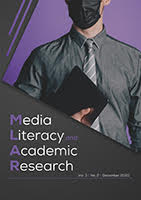Family Socioeconomic Status And Parents’ Education As Indicators Of The Primary Use Of Digital Media By Children
Family Socioeconomic Status And Parents’ Education As Indicators Of The Primary Use Of Digital Media By Children
Author(s): Petra PolievkováSubject(s): Social Sciences, Education, Media studies, Communication studies, Theory of Communication
Published by: Univerzita sv. Cyrila a Metoda v Trnave, Fakulta masmediálnej komunikácie
Keywords: Digital media;Functionality of digital media;Level of education;Restrictive mediation;Socioeconomic status
Summary/Abstract: This paper is a response to studies conducted in other countries on how the socioeconomicstatus of families affects the media use patterns and media education strategies imposed byparents on their children. Admittedly, research on the subject in Slovakia is largely lacking. Ourstudy is based on an assumption of a close relation between the level of education, householdincome and parents’ preference for the purpose to which children are allowed to use digitalmedia. Our research was conducted on a sample of 572 parents with children aged between3 and 8 living in the Žilina self-governing region. Based on the analysis, a mild correlation wasobserved between household income and the preference to allow children to use digital mediato avoid boredom and fill in the time without parental attention. The correlation between thelevel of education and preference for digital content was not confirmed. The research has ledto a conclusion that most parents tend to prefer exploiting the entertainment potential of digitaltechnologies while minimizing screen time. The conclusions of this research are compatiblewith similar studies pointing to the prevalence of restrictive (quantitative) mediation present inSlovak families.
Journal: Media Literacy and Academic Research
- Issue Year: 3/2020
- Issue No: 2
- Page Range: 63-76
- Page Count: 14
- Language: English

